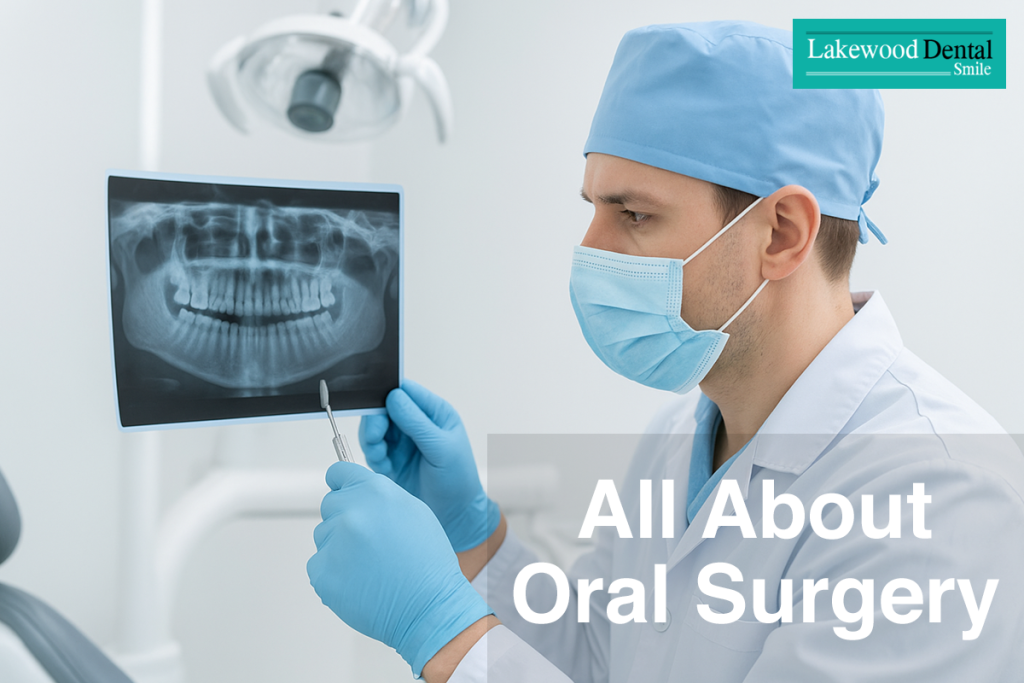Hearing that you’ve been referred for oral surgery can feel overwhelming. Many patients worry it will be painful or that it means something is seriously wrong. In reality, oral and maxillofacial surgery is a specialized field of dentistry that focuses on treating conditions beyond the scope of general dental care. From wisdom tooth removal to jaw corrections, oral surgeons play a crucial role in restoring both oral health and confidence.
When Should You See an Oral Surgeon?
Usually, your dentist is the first professional to notice when something requires surgical care. If your condition involves the jaws, face, or complex procedures such as impacted tooth removal, you may be referred to an oral surgeon. This doesn’t always mean you have a severe problem — it simply ensures that your treatment is performed by a highly trained expert.
What Is Oral and Maxillofacial Surgery?
The word “oral” relates to the mouth, while “maxillofacial” refers to the jaws and face. Together, oral and maxillofacial surgery focuses on treating injuries, deformities, and diseases in these areas. Specialists complete years of advanced hospital-based training that covers both dentistry and medicine, allowing them to handle complex cases safely and effectively.

Common Conditions Treated with Oral Surgery
- Impacted Teeth
One of the most common reasons patients undergo oral surgery is impacted wisdom teeth. When teeth fail to emerge properly due to overcrowding, they may cause pain, swelling, or infection. An oral surgeon removes these teeth before they create long-term complications. - Jaw Joint Problems (TMJ Disorders)
Temporomandibular joint (TMJ) disorders can lead to jaw stiffness, popping sounds, headaches, and facial pain. In severe cases, oral surgery is recommended to restore natural movement and eliminate discomfort. - Bite Problems (Overbite/Underbite)
When the jaws are misaligned, patients may experience speech issues, chewing problems, and even breathing difficulties. Corrective oral surgery, often combined with orthodontic care, realigns the jaws and creates a balanced bite for improved function and appearance. - Cleft Lip and Palate Surgery
A cleft lip or palate is a congenital condition that can affect speech, eating, and overall facial appearance. Oral and maxillofacial surgeons play a vital role in correcting these conditions, often as part of a multidisciplinary team. - Dental Implants
Oral surgeons specialize in placing dental implants to replace missing teeth. This involves precise placement of titanium posts into the jawbone, ensuring long-term stability and natural-looking results. Implants not only restore chewing ability but also preserve facial structure. - Treatment for Pathological Conditions
Oral surgery is also used to treat cysts, tumors, and infections of the oral cavity, salivary glands, or jaw. Early treatment prevents progression while protecting vital structures of the face and neck. - Facial Trauma and Other Conditions
Severe injuries from accidents or sports may require oral surgeons to reconstruct bones, nerves, and soft tissues. Other cases, such as obstructive sleep apnea or chronic sinus problems, may also benefit from surgical treatment.
Oral Surgery at Lakewood Dental Smile, Michigan
At Lakewood Dental Smile in Dearborn, Michigan, patients receive advanced care from experienced dentists and oral surgeons. Our oral surgery services include:
– Tooth extractions (including wisdom teeth)
– Dental implant placement
– TMJ disorder treatment
– Corrective jaw surgery
– Reconstructive procedures for trauma or deformities
We understand that the thought of oral surgery can be intimidating, which is why our team prioritizes patient comfort, safety, and peace of mind. With modern techniques and compassionate care, we make procedures as stress-free as possible.
Final Thoughts
Oral surgery isn’t just about addressing dental problems — it’s about restoring health, function, and confidence. Whether you need wisdom tooth removal, dental implants, or corrective jaw surgery, seeking treatment from a qualified oral surgeon ensures the best results.
✨ If you’ve been referred for oral surgery, remember it’s a step toward better oral health and a brighter smile.




